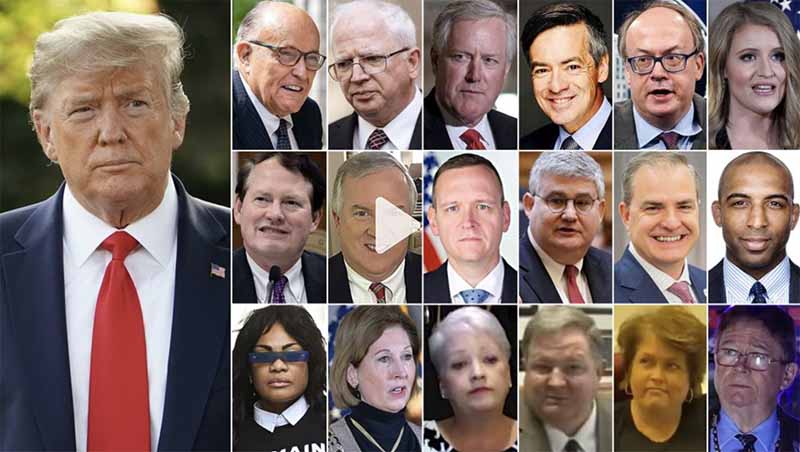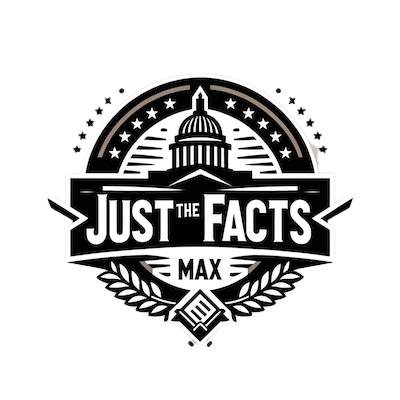JTFM:
In a world where the president of the United States can be indicted for a myriad of criminal acts at once, the question of why ex-president Trump isn't in jail yet is one that many are asking. And the answer to that is simple: he hasn't been convicted.
This saga's latest development comes from Georgia, where a district attorney in Fulton County announced an 11-count indictment against 19 of Trump's allies and associates. The case was filed using the state's RICO law, which uses language that conjures up the seedy underworld of mob bosses and gang leaders to tie together various crimes committed by different people who act together for the same criminal purposes. It's a powerful tool for prosecutors often used in cases against white-collar crime and political corruption. The lawsuit against the Trump cohort accuses them of running an "enterprise" and a "criminal organization" in a scheme to change the election results.
Among the alleged crimes are violating the *RICO act, solicitation of violations of an oath by a public officer, and conspiracy to commit forgery in the first degree. The defendants include Mark Meadows, a top Trump confidant, and lawyers Rudy Giuliani, Jenna Ellis, Sidney Powell, and Kenneth Chesebro. They allegedly worked to promote the idea of replacing Trump electors with bogus ones in states where he lost.
It would be hard to overstate the seriousness of the charges against the defendants, who face up to five years in prison if found guilty. They could also be ordered to pay a large sum in restitution. Defendants in a *RICO case are typically sentenced to prison, not probation.
What's more, the Trump indictment marks just the fourth time this year that he has faced criminal charges, and it was the third indictment related to election subversion.
The legal challenges faced by an ex-president, a candidate for the US presidency in 2024 and still popular among some Republicans, can be overwhelming. It's a remarkable situation.
It's impossible to say what will happen in the coming weeks and months, but there is one clear thing: if a jury convicts Trump on these charges, he should be in jail. That's because if any other person were accused of the same crimes, they would be.
According to John Sutter from NBC News, it is unacceptable for the country's leader to disregard the principles of democracy freely. Even if it means he may regain his position in the Oval Office, he must be held accountable for his actions for the greater good of society. He must be detained as soon as possible.

*These are the 19 people charged in the Georgia indictment connected to the Trump election scheme.
Attorney John Eastman
Attorney Jenna Ellis
Attorney Sydney Powell
Attorney Kenneth Chesebro
Attorney Ray Smith
Michael Roman-- Director of Election Day operations on Trump's 2020 campaign
Jeffery Clark-- Former Acting Assistant Attorney General for the Civil Division
Fake Electors Included in Indictment
Former State GOP Leader David Shafer
Former GOP Coffee County Party head Cathy Latham
State Senator Shawn Still -- Who is the only current elected official on the list.
Activists connected to Coffee County Included in Indictment
Misty Hampton-- Coffee County Elections Supervisor
Scott Hall-- Bail Bondsman
Activists who allegedly pressured Ruby Freeman
Willie Floyd III-- Leader of "Black Voices for Trump"
Stephen Lee-- A pastor from Illinois
Trevian Kutti-- A former Kayne Publicist accused of pressuring election workers.
Attorney Robert Cheeley
*What is the Rico Act?
The RICO Act is a powerful law that can be used to prosecute criminal enterprises for a wide range of offenses. While it is commonly associated with Mafia-related crimes, it can also be applied to punish those who engage in a pattern of wrongdoing.
The RICO Act was passed in 1970 after Senate hearings revealed the extent of criminal activities committed by ruthless crime families, such as the fictional Corleone. These families infiltrated labor unions, extorted businesses, peddled drugs, and bribed government officials to grow their operations. The act made it a federal crime to be part of an organized enterprise engaged in a "pattern of racketeering activity" that includes 35 crimes such as illegal gambling, counterfeiting, murder for hire, extortion, collection of unlawful debt, drug dealing, prostitution, and mail or wire fraud. To charge someone under the RICO Act, the government must prove that at least two of these "predicate" crimes were committed within ten years.
Numerous states have enacted versions of the RICO Act, with some staying close to the Justice Department's model and others significantly broadening its scope, such as Georgia. Even street gangs and corrupt politicians can be charged with RICO. However, RICO cases can be challenging to prove.
 JustTheFacts Max
JustTheFacts Max![]() -
-
Arts & Culture -
Mark Meadows
Ex-President Trump
Rico Act
Rudy Giuliani
Jenna Ellis
Sidney Powell
Kenneth Chesebro
-
1,038 views -
1 Comment -
0 Likes -
0 Reviews
-
-
Arts & Culture -
Mark Meadows
Ex-President Trump
Rico Act
Rudy Giuliani
Jenna Ellis
Sidney Powell
Kenneth Chesebro
-
1,038 views -
1 Comment -
0 Likes -
0 Reviews
![]() 0
0
0
226
1
0
0
0
226
1
Share this page with your family and friends.